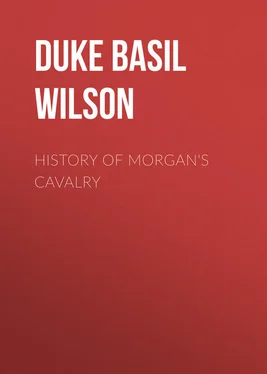Basil Duke - History of Morgan's Cavalry
Здесь есть возможность читать онлайн «Basil Duke - History of Morgan's Cavalry» — ознакомительный отрывок электронной книги совершенно бесплатно, а после прочтения отрывка купить полную версию. В некоторых случаях можно слушать аудио, скачать через торрент в формате fb2 и присутствует краткое содержание. Издательство: Иностранный паблик, Жанр: foreign_antique, foreign_prose, на английском языке. Описание произведения, (предисловие) а так же отзывы посетителей доступны на портале библиотеки ЛибКат.
- Название:History of Morgan's Cavalry
- Автор:
- Издательство:Иностранный паблик
- Жанр:
- Год:неизвестен
- ISBN:нет данных
- Рейтинг книги:3 / 5. Голосов: 1
-
Избранное:Добавить в избранное
- Отзывы:
-
Ваша оценка:
- 60
- 1
- 2
- 3
- 4
- 5
History of Morgan's Cavalry: краткое содержание, описание и аннотация
Предлагаем к чтению аннотацию, описание, краткое содержание или предисловие (зависит от того, что написал сам автор книги «History of Morgan's Cavalry»). Если вы не нашли необходимую информацию о книге — напишите в комментариях, мы постараемся отыскать её.
History of Morgan's Cavalry — читать онлайн ознакомительный отрывок
Ниже представлен текст книги, разбитый по страницам. Система сохранения места последней прочитанной страницы, позволяет с удобством читать онлайн бесплатно книгу «History of Morgan's Cavalry», без необходимости каждый раз заново искать на чём Вы остановились. Поставьте закладку, и сможете в любой момент перейти на страницу, на которой закончили чтение.
Интервал:
Закладка:
"If the disorganization of the present Union is not arrested," the Union men of Kentucky would also help it along. A modified phrase much in vogue with them, "separate State action" expressed their "conservative" plan of seceding. Unless the proper distinctions are drawn, however, the action of this class of politicians will always be misunderstood. They indignantly condemned the secession of South Carolina and Georgia. No language was strong enough to express their abhorrence and condemnation of the wickedness of those who would inaugurate "the disorganization of the present Union." But they did not, with ordinary consistency,
"Compound for sins they were inclined toBy damning those they had no mind to!"
They committed the same sin under another name, and advocated the "separate Confederacy" of "the border free and slave States," under our glorious Constitution thus amended.
"Orthodoxy," was their "doxy;" "Heterodoxy," was "another man's doxy." Every candid man, who remembers the political status of Kentucky at that period, will admit that the Union party propounded no definite and positive creed, and that its leaders frequently gave formal expression to views which strangely resembled the "damnable heresies of secession." Indeed, the neglect of the seceding States to "consult Kentucky," previously to having gone out, seemed to be, in the eyes of these gentlemen, not so much an aggravation of the crime of secession, as, in itself, a crime infinitely graver. There were many who would condemn secession, and in the same breath indicate the propriety of "co-operation." These subtle distinctions, satisfactory, doubtless, to the intellects which generated them, were not aptly received by common minds, and their promulgation induced, perhaps very unjustly, a very general belief that the Union party was actuated not more by a love of the Union, than by a salutary regard for personal security and comfort. It seemed that the crime was not in "breaking up the Union," but in going about it in the wrong way.
The people of Kentucky heard, it is true, from these leaders indignant and patriotic denunciations of "secession," and, yet, they could listen to suggestions amounting almost to advocacy, from the same lips, of "central confederacies" or "co-operations."
Is it surprising, then, that no very holy horror of disunion should have prevailed in Kentucky?
But any inclination to tax these gentlemen with inconsistency should be checked by the reflection that they were surrounded by peculiar circumstances. It appeared to be by no means certain, just then, that an attempt would be made to coerce the seceding States, or that the Southern Confederacy would not be established without a war. In that event, Kentucky would have glided naturally and certainly into it, and Kentucky politicians who had approved coercion, would have felt uncomfortable as Confederate citizens. The leaders of the Union party were men of fine ability, but they were not endowed with prescience, nor could they in the political chaos then ruling, instinctively detect the strong side. Let it be remembered that, just so soon as they discerned it, they enthusiastically embraced it and clave to it, with a few immaterial oscillations, through much tribulation. As was explained by one of the most distinguished among them (in the United States Senate), it was necessary to "educate the people of Kentucky to loyalty." It is true that in this educational process, which was decidedly novel and peculiar, many Kentuckians, not clearly seeing the object in view, were made rebels, and even Confederate soldiers, although not originally inclined that way.
But it is seldom that a perfectly new and original system works smoothly, and the "educators" made amends for all their errors by inflexible severity toward the rebels who staid at home, and by "expatriating" and confiscating the property of those who fled. A "States Rights Convention" was called to assemble at Frankfort on the 22nd of March, 1861, but adjourned, having accomplished nothing.
After the fall of Fort Sumpter and the issuing of the proclamation of April 15, 1861, Governor Magoffin responded to President Lincoln's call for troops from Kentucky in the following language:
"Frankfort, April 16, 1861 ." Hon. Simon Cameron, Secretary of War ;
"Your dispatch is received. In answer, I say, emphatically, that Kentucky will furnish no troops for the wicked purpose of subduing her sister Southern States.
"B. Magoffin, Governor of Kentucky ."Governor Magoffin then a second time convened the Legislature in extra session, to consider means for putting the State in a position for defense. When the Legislature met, it resolved,
"That the act of the Governor in refusing to furnish troops or military force upon the call of the Executive authority of the United States, under existing circumstances, is approved." Yeas, eighty-nine; nays, four.
On the 18th of April a large Union meeting was held at Louisville, at which the most prominent and influential Union men of the State assisted. Resolutions were adopted,
"That as the Confederate States have, by overt acts, commenced war against the United States, without consultation with Kentucky and their sister Southern States , Kentucky reserves to herself the right to choose her own position; and that while her natural sympathies are with those who have a common interest in the protection of slavery, she still acknowledges her loyalty and fealty to the Government of the United States, which she will cheerfully render until that Government becomes aggressive, tyrannical, and regardless of our rights in slave property;" Resolved,
"That the National Government should be tried by its acts, and that the several States, as its peers in their appropriate spheres , will hold it to a rigid accountability, and require that its acts should be fraternal in their efforts to bring back the seceded States, and not sanguinary or coercive."
The Senate resolved, just before the adjournment of the Legislature, that "Kentucky will not sever her connection with the National Government, nor take up arms for either belligerent party; but arm herself for the preservation of peace within her borders."
This was the first authoritative declaration of the policy of "Neutrality," which, however, had been previously indicated at a Union meeting held at Louisville on the 10th of April, in the following resolutions:
"That as we oppose the call of the President for volunteers for the purpose of coercing the seceded States, so we oppose the raising of troops in this State to co-operate with the Southern Confederacy."
"That the present duty of Kentucky is to maintain her present independent position, taking sides, not with the Administration nor with the seceding States, but with the Union against them both, declaring her soil to be sacred from the hostile tread of either, and, if necessary, to make the declaration good with her strong right arm."
In other words, Kentucky would remain in the Union, but would refuse obedience to the Government of the United States, and would fight its armies if they came into her territory. Was it much less "criminal" and "heretical" to do this than to "take sides with the seceding States?"
What is the exact shade of difference between the guilt of a State which transfers its fealty from the Union to a Confederacy, and that of a State which declares her positive and absolute independence, entering into no new compacts, but setting at defiance the old one? Where was the boasted "loyalty" of the Union men of Kentucky when they indorsed the above given resolutions?
In May of that year, the Louisville Journal , the organ of the Union party of Kentucky, said, in reference to the response which it was proper for Kentucky to make to the President's call for troops: "In our judgment, the people of Kentucky have answered this question in advance, and the answer expressed in every conceivable form of popular expression, and finally, clinched by the glorious vote of Saturday, is; arm Kentucky efficiently, but rightfully, and fairly, with the clear declaration that the arming is not for offense against either the Government or the seceding States, but purely for defense against whatever power sets hostile foot upon the actual soil of the Commonwealth. In other words, the Legislature, according to the manifest will of the people, should declare the neutrality of Kentucky in this unnatural and accursed war of brothers, and equip the State for the successful maintenance of her position at all hazards?"
Читать дальшеИнтервал:
Закладка:
Похожие книги на «History of Morgan's Cavalry»
Представляем Вашему вниманию похожие книги на «History of Morgan's Cavalry» списком для выбора. Мы отобрали схожую по названию и смыслу литературу в надежде предоставить читателям больше вариантов отыскать новые, интересные, ещё непрочитанные произведения.
Обсуждение, отзывы о книге «History of Morgan's Cavalry» и просто собственные мнения читателей. Оставьте ваши комментарии, напишите, что Вы думаете о произведении, его смысле или главных героях. Укажите что конкретно понравилось, а что нет, и почему Вы так считаете.












